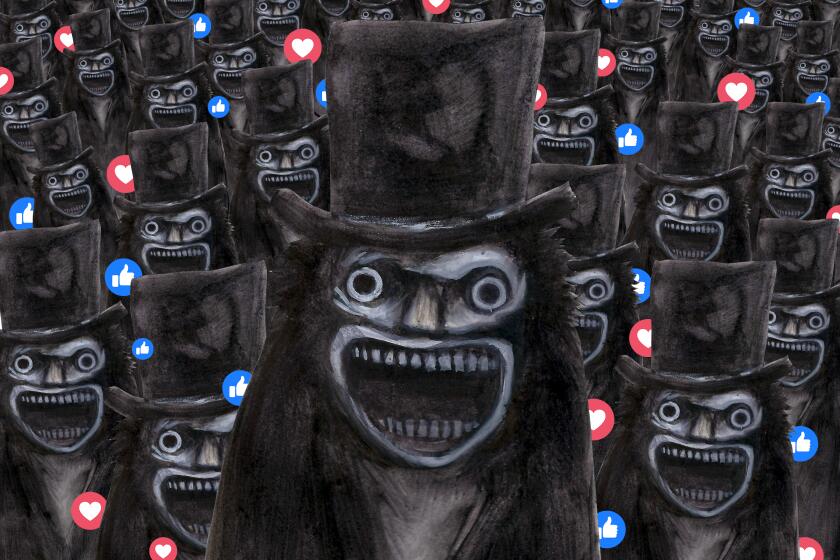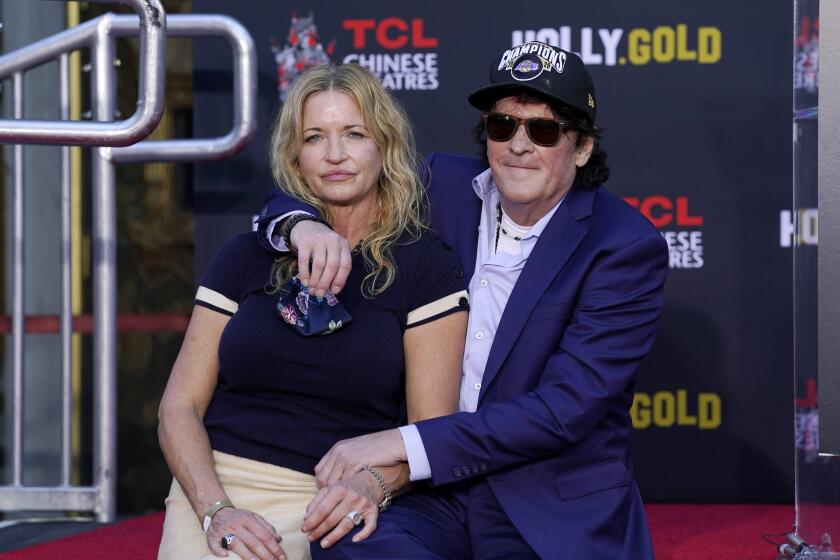Things are heating up
Marlene DERMER, founder and executive director of the Los Angeles Latino International Film Festival, tries not to show the stress of her job as she gamely greets a visitor this week at her cramped Hollywood offices, busy as a boiler room operation. She really shouldn’t be taking time for lunch, with four days left before the premiere of the week-long cinema celebration, now in its 11th year. As she enters the elevator, she passes a delivery boy wheeling in buckets of takeout for her staff, a smile masking her guilt for leaving her post even briefly.
As soon as she hits the sidewalk, the lady-like Dermer lights up a cigarette, cupping the match in her fine fingers and huddling against the scruffy building at Hollywood and Highland. She recently picked up the habit again, explains the svelte 45-year-old, sporting a long silk scarf wrapped around her neck. Over lunch, she’ll joke about being blamed for everything that goes wrong at the last minute, pretending to pull her hair out with the expressive gestures of someone who studied mime.
Interestingly, the recent success of Latino films in Hollywood has made it harder for the city-sponsored and corporate-funded festival to keep its pipeline filled with Latino productions from both sides of the border, but Dermer keeps at it, year-round.
The days before the festival are particularly hectic. Her latest emergency involves a film from Argentina, a ‘50s-era crime drama titled “La Seal” (The Signal), which arrived without English subtitles. Too late to send it back, Dermer got a local lab to add subtitles by calling in a connection from her stint at Paramount Studios, where she had supervised the adaptation of new movies for foreign consumption.
That’s just one of the challenges in running an international festival that works in the opposite direction, presenting Spanish-language films for domestic consumption. Starting Sunday, L.A. audiences will get the chance to see more than 100 feature films, shorts and documentaries from Spain, Latin America and the U.S. that otherwise would never come here. After a long run at the Egyptian Theatre, the festival this year moves to the ArcLight Cinemas.
Latino cinema -- whether in Spanish, English or Portuguese -- was largely ignored in this country a dozen years ago when Dermer joined forces with actor Edward James Olmos to launch the festival as a vehicle for exposing U.S audiences to Latino culture. Nowadays, Latino filmmakers have more options for reaching the U.S. market, where their films are often celebrated rather than shunned, an acceptance symbolized by the Oscar nominations showered this year on three top Mexican directors and their films.
Latinos also have more choices on the festival circuit, where incentives are dangled to attract exclusive premieres. But an ambitious director is more likely to seek a spot at Sundance, say, where there’s a better shot at being noticed and making a good deal.
The lesson for Dermer, who has worked much of her adult life to draw attention to Latino films: Careful what you wish for.
“It has gotten more difficult,” she says, “because whereas before nobody paid any attention, now filmmakers realize there’s money to be made,” she says, switching to Spanish to express her discontent. “It seems terrible to me because you forget who supported you at first.”
“The festival circuit is global and it’s very competitive,” says Chon Noriega, professor of cinema and media studies at UCLA. “Latino festivals have typically not been very high in that pecking order. So you have to be very proactive as a festival director to get really top flight films.”
Still, notes Noriega, Latino festivals like the one in L.A. remain “important entry points” for aspiring directors. Personally, the professor was looking forward to next Saturday’s screening of “La Lupe: Queen of Latin Soul,” a documentary about the exotic Cuban salsa singer directed by his friend, New York-based Cuban director Ela Troyano.
One documentary also has special meaning for me. “Below the Fold: The Pulitzer That Defined Latino Journalism,” directed by Roberto Gudio, tells the story of the team of reporters and editors at the Los Angeles Times, including the late Frank del Olmo, who won a Pulitzer Prize in 1984 for the groundbreaking series on the growing Latino population in Southern California. Another documentary with local relevance is “Father G and the Homeboys,” the story of four gang members from Boyle Heights who turn their lives around with the help of Father Gregory Boyle, a Jesuit who offered jobs as an alternative to violence. Directed by Pete Tapia and John Bohm, who also produced, the film is narrated in English by actor Martin Sheen.
Many of this year’s feature films have coming-of-age themes, notes Dermer. They include the closing night entry from actor-director Antonio Banderas, “El Camino de los Ingleses”(Summer Rain), set in Málaga, Spain, where a group of young adults explore love while delving into dark family secrets. The film, which Variety called a “broodingly intense yarn,” debuted at Sundance in December.
And there are more films by women directors than ever, she adds. Sunday’s opening night film, for example, “Under the Same Moon (La Misma Luna),” marks the feature film debut of Mexican director Patricia Riggen. The emotional story about a mother and son living on opposite sides of the border includes a cameo appearance by the classy norteo band Los Tigres Del Norte, who contributed to the soundtrack.
Dermer gestures like a thespian -- fists clenched, arms extended, hands crossed over her heart -- as she expresses her enthusiasm for her favorite films from this year’s roster. Her own immigrant experience fuels her passion for Latino cinema, she says. Born in Lima to a Peruvian mother who traces her lineage to Spanish viceroys and an American father of German descent, she moved to New Orleans with her family when she was 13.
Feeling out of place in her new world, she found refuge in the arts where “it was OK to be different.” She was dismayed by the lack of understanding of Latino culture among many Americans who would ask her if Peruvians had toilets and traffic lights, she says with a slight British accent, thanks to a former speech coach. She calls it an “innocent ignorance” that marks a great divide.
Movies can bridge that cultural gap, Dermer believes, so the festival aims to draw as diverse a crowd as possible. She thinks of these celluloid reels as windows on cultures that take us places we’ve never been.
After lunch, Dermer pauses again outside her building and lights up once more. Despite recent successes, she asserts, few Latino films are reaching wide U.S. audiences. That still makes her mission relevant.
“We’ll continue to be that bridge” for Latino filmmakers, she says. “Besides, who’s going to treat them better than we do?”
The 11th Annual Los Angeles Latino International Film Festival, Sunday through Oct 14, at the ArcLight Cinemas, 6360 W. Sunset Blvd., Hollywood, Tickets available at box office or at www.arclightcinemas.com. For film listings, go to www.latino film.org.
Shake-up in the alt-Latino scene
An e-mail last week gave me the first clue that something was changing for Los Abandoned, the charming and kinetic, creative bilingual band that has led L.A.’s alt-Latino scene. It was an invitation from the group’s lead singer who was performing with her father last weekend at a tribute in Santa Ana to the late Victor Jara, the martyred troubadour from her native Chile.
She signed her real name, Pilar Diaz, rather than the stage name she has insisted on as part of the band, Lady P.
Now comes word that Los Abandoned is breaking up. In an e-mail to fans sent Friday, the group announced that it was calling it quits after seven years. “Thank you for the memories, for believing in us, and for helping to make our dreams come true,” the message states.
It’s a huge loss for Los Angeles. No word yet on what Diaz and her bandmates plan to do next, beyond their final gig.
Los Abandoned plays its last show at 4:30 p.m. Sunday as part of Tarfest at La Brea Tar Pits Park, 5801 Wilshire Blvd., Los Angeles. For information, go to www.tarfest.com.
More to Read
Only good movies
Get the Indie Focus newsletter, Mark Olsen's weekly guide to the world of cinema.
You may occasionally receive promotional content from the Los Angeles Times.










